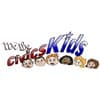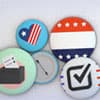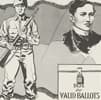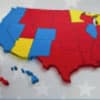Elections/Debates

 The Civics Kids
The Civics Kids The Civics Kids encourage each of you to take the opportunity to better understand the election process and how you can become a change agent in your classroom, school, home and community. Remember...someday one of you could become President of the United States.
 PBSLearningMedia
Election Collection
PBSLearningMedia
Election Collection
Voting and elections are an essential part of democracy. Keep up with with election news, study the history and process of presidential elections, explore voting rights, and engage in classroom debates with these videos, activities, and lesson plans. Use our interactive Electoral Decoder to explore electoral college results from previous elections, and predict the outcomes of the U.S presidential elections thoughout history.
 9 Ways to Teach about the Election Process
9 Ways to Teach about the Election Process
Campaigns and elections are ripe with opportunity to discuss government, the electoral process, civics and history as well as the myriad of specific issues that are important to the public during any particular year, whether it’s a local or presidential election.
 Teaching about Elections
Teaching about Elections
Elections and voting provide many interesting opportunities to teach students about civics, how government works, the electoral process, current events, historical context and campaign politics
 Bill of Rights Institute: Lesson Plan Voting
Bill of Rights Institute: Lesson Plan Voting
America holds more elections than any other democracy. The reason is federalism. Because of decentralization there are more offices for the electorate to fill and thus more elections.
 iCivics Mini-lessons; Midterm Elections (HS)
iCivics Mini-lessons; Midterm Elections (HS)Students will learn about the midterm election, its role as a referendum on the presidency, and how a shift in party control impacts the legislative and executive branches
 C-Span Classroom
Lesson Plans: Campaigns and Elections
C-Span Classroom
Lesson Plans: Campaigns and Elections Free video-based materials for social studies teachers
 KQED Voting Rights and Electoral College Lesson Plans
KQED Voting Rights and Electoral College Lesson Plans
Voting Rights, Then and Now
Debating the Electoral College
 Learning for Justice
The Truth about Voting
Learning for Justice
The Truth about Voting
In this lesson, students will learn some common myths about voting today, think through who these myths might benefit, learn why these myths are incorrect and consider how people might ensure every eligible citizen has a chance to vote. In an extension activity, students learn how to register to vote.


 UTAH EDUCATION NETWORK
UTAH EDUCATION NETWORK

 Justin
Justin Dani
Dani Rob
Rob Val
Val Kayla
Kayla
